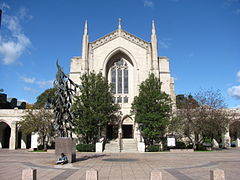Marsh Chapel is a building on the campus of Boston University used as the official place of worship of the school. It was named for Daniel L. Marsh, a former president of BU and a Methodist minister. The building is Gothic in style.[1]
| Marsh Chapel | |
|---|---|
 Exterior of chapel | |
 | |
| Location | Boston, Massachusetts |
| Country | United States |
| Denomination | Non-denominational |
| Architecture | |
| Functional status | Active |
| Architect(s) | Ralph Adams Cram |
| Architectural type | Chapel |
| Style | Gothic revival |
| Groundbreaking | 1949 |
| Completed | 1950 |
| Clergy | |
| Dean | Robert Hill |
While Methodism, the university's historical denomination, exerts a great influence on the chapel, it is formally non-denominational. The current dean of Marsh Chapel is Rev. Dr. Robert Hill, an ordained elder in The United Methodist Church.[1]
History
editPlans for a riverside chapel at the university were made as early as 1920, when the university purchased the 15-acre (0.061 km2) Charles River Campus and commissioned a master plan from architect Ralph Adams Cram. Originally, the chapel was to be complemented by the Alexander Graham Bell tower, a Gothic Revival administrative structure named for the inventor of the telephone and other innovations.[2]
The chapel was not constructed until after the Great Depression and Second World War. Ralph Adams Cram was selected as its architect. He designed the building in the Gothic style. The building was dedicated in 1950. Because of competition from Modernist and other architectural influences, the chapel marked the end of a period of Collegiate Gothic construction on American campuses.[citation needed]
Good Friday experiment
editThe chapel was the site of the Marsh Chapel Experiment on Good Friday in 1962. Researchers studying human thought included Walter Pahnke; Timothy Leary, a Harvard professor and later psychedelic guru; and Richard Alpert (who would later become known as Ram Dass).
Influence on Civil Rights Movement
editBetween 1953 and 1965, African-American theologian Howard Thurman presided the chapel as its dean. Thurman exerted an enormous influence on the work of Civil Rights Movement leader Martin Luther King Jr., who studied at Boston University.[3]
Other notable figures associated with Marsh Chapel
edit- Robert Cummings Neville, one of the Boston Confucians, served as a dean of the chapel
References
edit- ^ a b "Icons Among Us: Marsh Chapel | BU Today". Boston University. Archived from the original on 2021-09-04. Retrieved 2021-09-04.
- ^ Lasser, Allan. "The Campus That Could Have Been". Buquad.com. Archived from the original on 6 October 2014. Retrieved 4 December 2014.
- ^ "Who Was Howard Thurman?". Boston University. Archived from the original on 2021-04-09. Retrieved 2021-09-04.